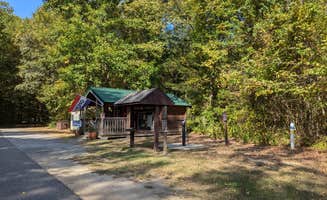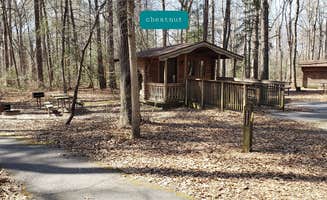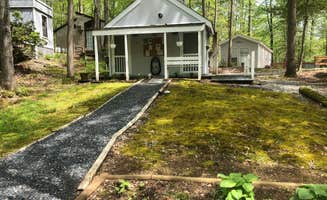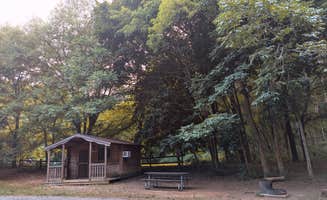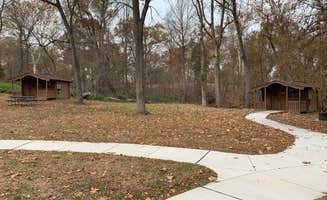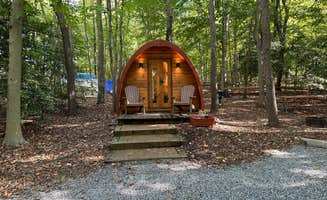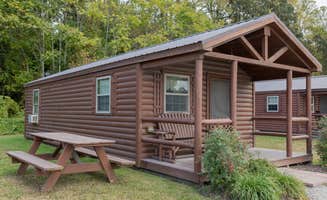Cabin camping near Queenstown, Maryland offers seasonal lodging options within an hour's drive of major Maryland waterways. Located in Queen Anne's County at an elevation of 50 feet above sea level, this region experiences mild winters and humid summers with average temperatures ranging from 35°F in January to 87°F in July. Most park cabin structures require advance booking through the Maryland Department of Natural Resources reservation system.
What to Do
Kayaking access points: At Martinak State Park Campground, the waterfront provides direct river access. "Beautiful waterfront great for kayaking and water sports. No real hiking trails. Overall small quiet campground," notes Laura M. The park offers canoe rentals for exploring the interconnected river trails system.
Hiking with elevation: Susquehanna State Park Campground trails range from easy walks to moderate climbs. "Scared a bunch of deer and checked out the giant old growth trees, hiked over a bridge and stream which was full of fish I could see! Turned around after I got to the Susquehanna itself," reports Anne L. The river trails feature clear marking with connecting paths between major park attractions.
Disc golf course: Tuckahoe State Park Campground maintains a full disc golf course accessible year-round even when some camping facilities close seasonally. The park combines recreation with nature activities, offering "nice pads, even with rain none were flooded. The wooded area makes you feel a little more secluded from any neighbors," according to Kasey M.
What Campers Like
Clean bathroom facilities: Elk Neck State Park Campground maintains well-serviced bathhouses even during off-season periods. "Bathhouses were open with hot water. Nice clean bathhouses. Sites were level, spacious, spaced apart, with packed gravel surface," says Laure D. The North East loop offers full hookup sites with bathroom access throughout winter months.
Commercial washing stations: Tuckahoe State Park provides specialized washing equipment that improves the camping experience. "I LOVE the commercial-sized washing sink for your dishes, since you don't have full hookups its a BIG deal," explains Kasey M. These stations reduce water usage at individual sites while providing heated washing options.
Separated camping loops: Patapsco Valley State Park organizes sites into distinct areas that reduce congestion. "It's a small state park campground, one of only two in the massive Patapsco Valley State Park," notes Sean M. This separation creates quieter experiences even during peak weekend periods.
What You Should Know
Water limitations at cabins: Most cabin sites require bringing water from central spigots rather than having direct connections. "There isn't much to do in the park but it was an ok jumping off point to visit St. Michaels. Good dump station and potable water fill. Spigots throughout the campground," advises Adam and Suzanne B. at Tuckahoe State Park.
Site size restrictions: Some parks have significant limitations for larger vehicles or equipment. "We booked site 21, blind. The web site does not say site 21 is extremely small. We have a 25' camper, and it barely fit, length and width were an issue," warns Buck P. This applies particularly to older loop sections at state parks.
Seasonal staffing impacts: Martinak State Park Campground operates with reduced services in shoulder seasons. "The store was not open during our visit," reports Bill F. Winter cabin operations may have limited ranger presence and maintenance responses compared to peak summer periods.
Tips for Camping with Families
Multiple playground options: Martinak State Park provides play structures throughout the grounds. "They have quite a few playgrounds throughout the park, which was a major plus for us," shares Bill F. These dispersed facilities reduce crowding during busy weekends.
Nature center programs: Susquehanna State Park Campground runs structured educational activities. "There are plenty of park events to keep you busy. Took a nice hike out to the susquehanna and spent a few hours fishing in the pond. Lots of wildlife," according to Gabrielle E. These programs typically run Memorial Day through Labor Day.
Cabin selection strategy: Reserve cabins near bathhouses when camping with young children. "I wish there was a little bit more room in between the campers for privacy but it did not hurt our stay," Jonathan B. notes about Cherry Hill Park. Request end-unit cabins when possible for additional play space.
Tips from RVers
Limited cellular connectivity: Cell service varies significantly between parks in the region. "No cell signal in the campground so the family is forced to disconnect. I absolutely love it!" explains Megan S. about Patapsco Valley State Park. Download offline maps before arrival for navigation.
Winter-specific considerations: Washington DC / Capitol KOA maintains extended seasonal operation. "They have a nice area for kids (pool, playground, jumping pillow, basketball courts, giant chess, etc). If you get an area to back into it'll be more secluded, but the pull through spots offer no privacy," advises Elise M. Winter cabin rentals require confirming which amenities remain operational.
Electric limitations: Electrical systems may not support high-demand appliances during peak periods. "We lost power during a rain storm," reports Sean R. at Tuckahoe State Park. Bring backup power options when weather forecasts indicate thunderstorms.


